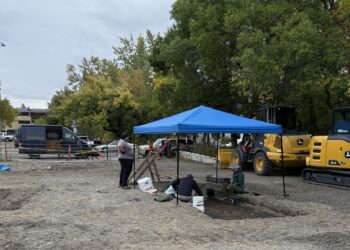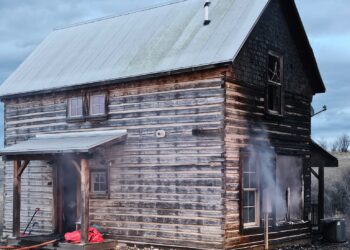By Shaylee Ragar UM LEGISLATIVE NEWS SERVICE
HELENA — The state of Montana’s coal industry is in flux.
Conservationists credit the market’s move away from fossil fuels. Industry leaders blame strict regulations.
Rep. Mary Ann Dunwell, D-Helena, is carrying House Bill 193, also called the Montana Climate Action Act, which would tack a $10 tax onto each ton of carbon emissions. During the House Taxation Committee hearing Jan. 30, Dunwell argued to move away from coal energy because it negatively affects public health, the environment and the economy.
The bill calls for splitting the projected $210 million yearly revenue generated by the tax between the state’s general fund and the “redevelopment” of impacted communities who rely on fossil fuels.
Bob Gilbert, a former legislator from Sidney who now works as a lobbyist, testified against the bill, representing the town of Colstrip. He asked how the bill would replace hundreds of lost jobs and why 50 percent of the revenues would go to the general fund. He also disputed the public health argument.
“Don’t give me the garbage that coal is killing people,” Gilbert said.
The two-hour hearing drew 11 proponents of the bill, including Anne Hedges of the Montana Environmental Information Center, who implored lawmakers to consider the expensive consequences of climate change disasters.
Fourteen different groups and individuals opposed the bill at the hearing, including David Hoffman with NorthWestern Energy, who said the cost of the tax would increase Montanans’ utility prices.
While coal has often been a contentious topic, the dramatic changes in the national coal industry and the impending 2022 closure of units one and two of the coal-fired power plants in Colstrip have added urgency to the debate. The closures are part of a 2016 settlement in a suit filed by environmental groups claiming the plant was violating the Montana Clean Air Act.
Colstrip’s state senator, Republican Duane Ankney said the loss of coal mining would be a huge hit to Montana’s economy.
Last year, the Montana Chamber Foundation commissioned the Bureau of Business and Economic Research at the University of Montana, with the aid of industry leaders, to make a report predicting the economic impacts of reducing coal production.
It found the state would lose roughly 3,000 jobs in all and about $80 million in state collection revenues each year between 2028 and 2043.
According to the federal Energy Information Administration (EIA), national coal exports declined drastically between 2013 and 2016, during the Obama administration, which introduced new carbon emission regulations and pushed for use of renewable energy sources like wind and solar.
University of Montana law professor Samuel Panarella said two main factors are contributing to coal’s demise: competitively priced natural gas and cheaper batteries that can store electricity from renewable energy.
“I don’t have the view that it’s Obama-era legislation that is causing coal to be in a slump,” Panarella said.
In Montana, 2017 was the first year coal accounted for less than 50 percent of the state’s energy generation according to the EIA’s profile of the state, yet the EIA also noted that Montana has the largest coal reserve in the U.S. with 75 percent of mined coal slotted for exported.
Those exports are now struggling to reach high-demand foreign markets, like Asia, with states like Washington blocking construction of a coal export port.
Montana Rep. Joe Read, R-Ronan, introduced House Resolution 4 in January, which requests the federal government intervene. The resolution claims that Washington is violating the interstate commerce clause of the U.S. Constitution, and that the state is discriminating against the project because it involves coal.
Others, like the Northern Plains Resource Council, argue that Washington has the right to govern the environmental quality of its land and water. When the Washington Department of Ecology denied the Millennium Bulk Terminals permit, it released a statement saying there were too many, “unavoidable and negative environmental impacts,” to allow for the port.
For now, the debate rages on.














